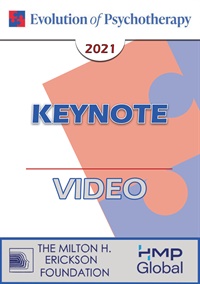
- Average Rating:
- Not yet rated
- Topic Areas:
- Addiction | Attachment | Couples Therapy | Keynotes | Love | Relationships
- Categories:
- Evolution of Psychotherapy | Evolution of Psychotherapy 2021
- Faculty:
- Helen E. Fisher, PhD
- Course Levels:
- Master Degree or Higher in Health-Related Field
- Duration:
- 1 hour
- Format:
- Audio and Video
- Original Program Date:
- Dec 03, 2021
- Short Description:
- Is technology changing love? Why do you fall in love with one person rather than another? Why is the rejected brain primed for psychotherapy? How can you use neuroscience to keep love alive? And where are we headed in our digital age? Anthropologist and neuroscientist Dr. Helen Fisher uses her brain scanning work (fMRI) to discuss three basic brain systems that evolved for mating and reproduction--the sex drive, romantic love, and attachment; each plays a pivotal role in human health and happiness. And she uses her data on 50,000 single Americans to explain a new (and positive) trend in courtship, what she calls “slow love.” She then discusses her data on the biological foundations of human personality—specifically four basic styles of thinking and behaving that impact love relationships and all other social interactions.
- Price:
- $59.00 - Base Price

- Average Rating:
- Not yet rated
- Topic Areas:
- Clinical Demonstrations | Couples Therapy | Developmental Therapy Model
- Categories:
- Evolution of Psychotherapy | Evolution of Psychotherapy 2021
- Faculty:
- Ellyn Bader, PhD
- Course Levels:
- Master Degree or Higher in Health-Related Field
- Duration:
- 1 hour
- Format:
- Audio and Video
- Original Program Date:
- Dec 01, 2021
- Short Description:
- Couples say they want better communication often without having the developmental capacities to bring about what they so desperately desire. The Initiator-Inquirer Process can be used to increase clients' capacity for empathy, self-definition and giving when it is not convenient.
- Price:
- $59.00 - Base Price

Credit available - Click Here for more information
- Average Rating:
- Not yet rated
- Topic Areas:
- Couples Therapy | Sex and Sexuality | Intimacy | Keynotes
- Categories:
- Couples Conference | Couples Conference 2021 | Online Continuing Education
- Faculty:
- Martha Kauppi, MS MFT
- Course Levels:
- Master Degree or Higher in Health-Related Field
- Duration:
- 1 Hour 3 Minutes
- Format:
- Audio and Video
- Original Program Date:
- Jun 06, 2021
- Short Description:
- Desire resides at the intersection of multiple systems, encompassing purely sexual aspects, numerous physiologic components, and a vast web of emotional, spiritual, and relational issues. In this skills-based presentation, Martha shares her approach to understanding complicated interconnected presenting symptoms, relational dynamics, and conceptualizing and treating issues related to desire.
- Price:
- $29.00 - Base Price

Credit available - Click Here for more information
- Average Rating:
- Not yet rated
- Topic Areas:
- Couples Therapy | Therapist Development | Topical Panels
- Categories:
- Couples Conference | Couples Conference 2021 | Online Continuing Education
- Faculty:
- Stan Tatkin, PsyD, MFT | William Doherty, PhD | Ellyn Bader, PhD
- Course Levels:
- Master Degree or Higher in Health-Related Field
- Duration:
- 1:00:44
- Format:
- Audio and Video
- Original Program Date:
- Jun 06, 2021
- Short Description:
- Issues in individual therapy can affect primary relationships. Therapists should be sensitive to such issues.
- Price:
- $29.00 - Base Price

Credit available - Click Here for more information
- Average Rating:
- Not yet rated
- Topic Areas:
- Couples Therapy | Relationships | Anxiety | Continuing Education | Mindfulness | Topical Panels | Treatment Planning
- Categories:
- Couples Conference | Couples Conference 2021 | Online Continuing Education
- Faculty:
- Helen LaKelly Hunt, PhD | Caroline S. Welch | Stan Tatkin, PsyD, MFT | Shawn Giammattei, PhD
- Course Levels:
- Master Degree or Higher in Health-Related Field
- Duration:
- 58 Minutes
- Format:
- Audio and Video
- Original Program Date:
- Jun 06, 2021
- Short Description:
- Acting out is a response to anxiety, and such behavior can be targeted to a partner. Methods of assessing and addressing acting out will be covered.
- Price:
- $29.00 - Base Price

Credit available - Click Here for more information
- Average Rating:
- Not yet rated
- Topic Areas:
- Couples Therapy | Sex and Sexuality | Continuing Education | LGBTQ | Gender | Keynotes | Relationships
- Categories:
- Couples Conference | Couples Conference 2021 | Online Continuing Education
- Faculty:
- Joseph Winn, MSW, LICSW, CST-S
- Course Levels:
- Master Degree or Higher in Health-Related Field
- Duration:
- 1 Hour 2 Minutes
- Format:
- Audio and Video
- Original Program Date:
- Jun 06, 2021
- Short Description:
- This keynote will highlight core themes that are imperative for therapists to consider before working with relational systems that exist beyond the purview of heteronormativity. Specific topics will include becoming aware of ones sexological world views, understanding and working with sexual and relational health, and exploring what variant sexual, erotic and relational systems may offer heteronormative and monogamous couples in terms of increasing vulnerability, differentiation, and deepening relational attunement.
- Price:
- $29.00 - Base Price

Credit available - Click Here for more information
- Average Rating:
- Not yet rated
- Topic Areas:
- Couples Therapy | IMAGO | Communication | Keynotes | Relationships
- Categories:
- Couples Conference | Couples Conference 2021 | Online Continuing Education
- Faculty:
- Harville Hendrix, PhD | Helen LaKelly Hunt, PhD
- Course Levels:
- Master Degree or Higher in Health-Related Field
- Duration:
- 1 hour
- Format:
- Audio and Video
- Original Program Date:
- Jun 06, 2021
- Short Description:
- Since life is lived in the Space-Between and remembered in the Space-Within, the quality of “interaction” between intimate partners determines the content of subjective life. Using the power of Imago Dialogue facilitated by the therapist, couples are empowered to achieve their own transformation. Participants at this presentation will hear and see a demonstration of the essences of the process.
- Price:
- $29.00 - Base Price

Credit available - Click Here for more information
- Average Rating:
- Not yet rated
- Topic Areas:
- Couples Therapy | Infidelity | Gender | Topical Panels
- Categories:
- Couples Conference | Couples Conference 2021 | Online Continuing Education
- Faculty:
- Ellyn Bader, PhD | Martha Kauppi, MS MFT | Joseph Winn, MSW, LICSW, CST-S
- Course Levels:
- Master Degree or Higher in Health-Related Field
- Duration:
- 1 Hour 3 Minutes
- Format:
- Audio and Video
- Original Program Date:
- Jun 06, 2021
- Short Description:
- Two issues central to working with couples are jealousy and infidelity. These issues affect couples of diverse gender orientations.
- Price:
- $29.00 - Base Price

Credit available - Click Here for more information
- Average Rating:
- Not yet rated
- Topic Areas:
- Couples Therapy | LGBTQ | Continuing Education | Keynotes | Gender
- Categories:
- Couples Conference | Couples Conference 2021 | Online Continuing Education
- Faculty:
- Shawn Giammattei, PhD
- Course Levels:
- Master Degree or Higher in Health-Related Field
- Duration:
- 1 Hour 9 Minutes
- Format:
- Audio and Video
- Original Program Date:
- Jun 06, 2021
- Short Description:
- Dr. Giammattei will present the underlying framework that therapists who work with transgender or gender expansive (TGE) couples need to understand in order to provide gender affirming treatment. He will share ways to explore your own hetero/cis-normative beliefs around coupling and how these influence the models you choose, the questions you ask, and the interventions you use. While TGE couples experience many of the same issues as other couples, we will explore the minority stress and unique stressors that impact these issues in profound ways.
- Price:
- $29.00 - Base Price

Credit available - Click Here for more information
- Average Rating:
- Not yet rated
- Topic Areas:
- Couples Therapy | Communication | Conflict | Keynotes | Relationships
- Categories:
- Couples Conference | Couples Conference 2021 | Online Continuing Education
- Faculty:
- Ellyn Bader, PhD
- Course Levels:
- Master Degree or Higher in Health-Related Field
- Duration:
- 1 Hour
- Format:
- Audio and Video
- Original Program Date:
- Jun 05, 2021
- Short Description:
- Increasingly more and more couples are working together or working virtually in the same space. It is estimated that in the United States 43% of small businesses are family-run and 53% of managers share day-to-day management with a spouse. Working together tends to eclipse romance and dominate a couples life. As therapists, we tend to look at our couples/clients mainly through the lens of our favorite therapy model. However, couples who work together face unique challenges that are not rooted in attachment styles or family of origin conflicts.
- Price:
- $29.00 - Base Price
Please wait ...

